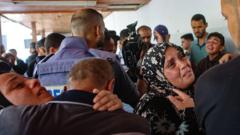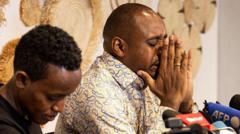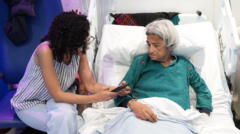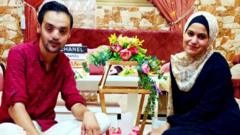The Democratic Republic of Congo's government has imposed a ban on media coverage of former President Joseph Kabila, escalating tensions as he returns to the country.
DR Congo Media Ban on Kabila Raises Tension

DR Congo Media Ban on Kabila Raises Tension
Government restricts press freedom amidst political unrest
The Congolese government has issued a prohibition on reporting related to the activities of former President Joseph Kabila and interactions with his political party. This decision follows Kabila's return to the Democratic Republic of Congo last month after a voluntary two-year exile, coinciding with increasing conflict between him and current President Félix Tshisekedi's administration. Accusations of treason, compounded by alleged connections to the M23 rebel group, which are reportedly engaging in combat against the Congolese army, have prompted authorities to consider prosecuting Kabila.
Christian Bosembe, head of the media regulatory body known as the Supreme Council of Audiovisual and Communication (CSAC), stated that any media outlets violating this ban will face suspension. In response, a spokesperson for the M23 indicated that they would not enforce this ban in regions under their control. Kabila himself has not issued a statement, but his party's secretary, Ferdinand Kambere, condemned the ban as an "arbitrary" measure on social media platform X.
Kabila, recently seen in Goma - a city under M23 jurisdiction - has criticized the central government significantly, especially following the senate's vote to revoke his legal immunity related to the accusations against him. There are claims that Rwanda supports the M23 rebels, though the Rwandan government denies these allegations.
Despite not facing any charges, Kabila characterized the present government as a "dictatorship," a description dismissed by an official spokesperson who argued Kabila lacks credible alternatives. Activist Jean-Claude Katende has characterized the government's media ban as an "abuse of power." Political analyst Ambroise Mamba warned that such prohibitions may counterproductively heighten public curiosity about Kabila's activities, which are actively monitored and posted by his party on social media since his return.
This ongoing struggle illustrates the fragile dynamics of power within the Democratic Republic of Congo, as both the government and Kabila navigate a complex and hostile political landscape.
Christian Bosembe, head of the media regulatory body known as the Supreme Council of Audiovisual and Communication (CSAC), stated that any media outlets violating this ban will face suspension. In response, a spokesperson for the M23 indicated that they would not enforce this ban in regions under their control. Kabila himself has not issued a statement, but his party's secretary, Ferdinand Kambere, condemned the ban as an "arbitrary" measure on social media platform X.
Kabila, recently seen in Goma - a city under M23 jurisdiction - has criticized the central government significantly, especially following the senate's vote to revoke his legal immunity related to the accusations against him. There are claims that Rwanda supports the M23 rebels, though the Rwandan government denies these allegations.
Despite not facing any charges, Kabila characterized the present government as a "dictatorship," a description dismissed by an official spokesperson who argued Kabila lacks credible alternatives. Activist Jean-Claude Katende has characterized the government's media ban as an "abuse of power." Political analyst Ambroise Mamba warned that such prohibitions may counterproductively heighten public curiosity about Kabila's activities, which are actively monitored and posted by his party on social media since his return.
This ongoing struggle illustrates the fragile dynamics of power within the Democratic Republic of Congo, as both the government and Kabila navigate a complex and hostile political landscape.



















